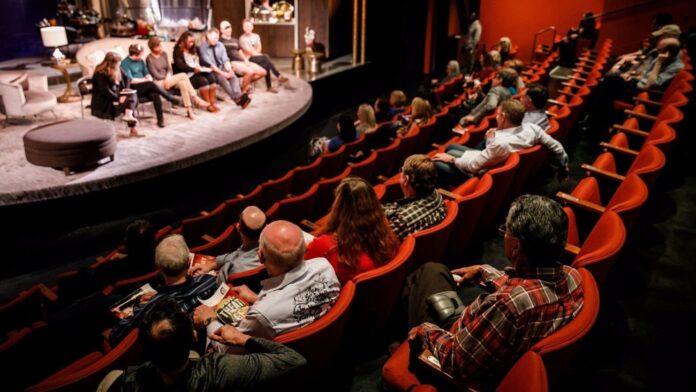
Post-show talkbacks are events that theater artists both love and hate. Connecting with the audience and hearing their feedback is heavenly, but some of the questions and behaviors are hellish.
What can you do to keep the experience in the angelic range with the heat turned down? Try keeping in mind the following dos and don’ts.
Do….
· Be polite. You may be furious with the things said in the play and the talkback is a good time to address that—but stay focused on the work, don’t be rude to the people involved.
· Remember that questions are better than comments. While you may have played an extra in your middle school’s junior production of the same play, sharing those anecdotes are better saved for your friends at dinner later.
· Work up the courage to ask something about the show that you want to know. Actors appreciate it. “People stay for talkbacks because an interest has been kindled or a debate begun,” said Actor Mark Gmazel who says he has participated in at least 100 talkbacks. “We must remember it is very difficult for the general public to formulate a question and then to overcome fear and speak in front of a microphone in front of everyone. This is the highest compliment a production can receive, even above a standing ovation.”
· Speak clearly—and if there is no microphone, speak loudly.
· Ask questions that are pertinent to the production you have just seen. Actors love knowing you were paying attention and that what they did meant something to you.
· Ask about technical elements of the show. Did you like the costuming? Are you curious how a particular part of the set was made? Do you want to know if the scoring was original? Ask away! The technical staff, like actors, love knowing you noticed their work.
· Be forgiving if an actor misspeaks when answering your question, especially if your language is different from theirs. Andaiye Spencer recalls a talkback in Germany when German high school students asked her group what sights they had seen in Germany. “We had gone to see ‘The New Swanstone Castle,’ but because our German was terrible, we were pronouncing it so it translated into ‘The New Cockstone Castle.’ Unbeknownst to us at the time, the word for ‘swan’ and the slang for ‘dick’ are very similar.”
Don’t….
· Ask the actors why their choices were so lame. No, really, don’t do that.
· Clip your nails while asking questions. Some people get grossed out by that and may be too distracted to adequately answer your question. For that matter, don’t clean out your ears or burp (if you can help it) while asking questions either.
· Criticize if you weren’t paying attention. “In college, a man was very angry with how ‘lewd’ the script was and how dare we perform such filth,” recalled JM Ethridge of a comment made during a talkback of Shakespeare’s “As You Like It.” “We sat there, unsure what to say. He had fallen asleep during Act 1.”
· Be surprised if your behavior during the show was noticed. Remember that, unlike the movies, the actors are in the same room as you. If you talked through the show and then criticize the actors because you couldn’t hear them, you might get called up short, most likely by another member of the audience.
· Get cutesy or get on the stage with the artists. Steve Ledyard recalls a talkback for the show “Conspiracy” where an audience member stepped onto the stage, saluting and giving a “Heil Hitler.” “He tried to justify it as coming ‘en scene’ with the actors. No, man. Just, just no.”
· Monopolize the talkback. You may have a lot of questions, but so might the other members of the audience. And you don’t want to have to be “that person” to whom the moderator running the talkback has to say, “Let’s give someone else a chance to speak now.”
· Ramble. It can be hard to be concise or brief, but make that your goal.
All that said, a talkback is designed to be a great experience for audiences. It is an opportunity to strengthen the connection between the art and the audience. For new works, it is an opportunity for audience members to influence the work with the feedback they provide.
“Talkbacks represent one of the greatest powers of theater,” Gmazel said. “It is a truly shared moment between the artists and the consumers. I don’t remember any comments or criticisms from any talkbacks I’ve been in over the years, just smiling faces.”
Bonus: Try out these questions
1. What research did you do to more deeply understand your character or the play?
2. What do you like most about your character?
3. Is there anything put forth in this play that you disagree with?
4. Why did you make the choice (and describe the choice you are referring to) that you did?
5. What was the most unexpected thing you learned while rehearsing and performing this show?
6. Why do you think this show is relevant to these times? Why perform in now?
7. Has a year-plus of isolation during the pandemic changed the way you approached or interpreted this work as an actor/director/designer?
8. What would you do differently if you got another opportunity to perform this role?
9. What is it about the vision of this production that you find most satisfying?
And a question to avoid: “How do you learn all those lines?”
OnStage Blog Staff
Curated From www.onstageblog.com Check Them Out For More Content.

